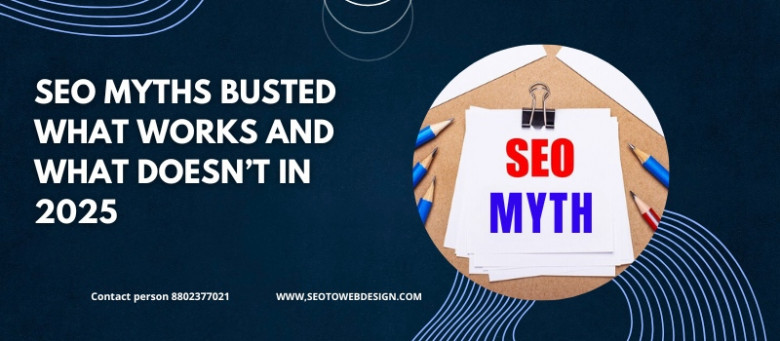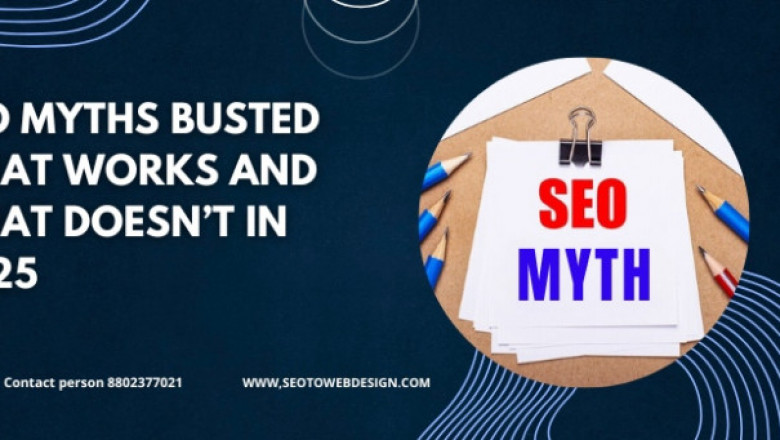views
In the ever-changing world of digital marketing, Search Engine Optimization (SEO) remains essential for driving organic traffic and boosting visibility. However, the rapid evolution of algorithms and techniques has led to a range of myths and misconceptions. These myths, if followed, can hurt your SEO efforts rather than help them. As we step into 2025, it's more important than ever to separate fact from fiction. This blog will debunk common SEO myths and highlight what truly drives success today.
1. Myth: Keyword Stuffing Improves Rankings
Busted: In the early days of SEO, cramming a page with keywords might have worked. But today, search engines like Google have become highly advanced. Keyword stuffing no longer improves rankings; in fact, it can lead to penalties. Google's algorithms now focus on delivering high-quality content that genuinely addresses user needs. What Works in 2025: Prioritize semantic SEO and focus on user intent. Instead of overusing specific keywords, create content that answers users’ questions and provides value. Use related terms naturally within your content, and aim for well-researched, engaging, and informative writing that meets search intent.
2. Myth: Meta Tags Are the Most Important SEO Factor
Busted: While meta tags like titles and descriptions still play a role, they are no longer the most critical factor. Modern SEO considers a wide range of elements, including mobile optimization, page speed, and user engagement. What Works in 2025: Meta tags matter for improving click-through rates (CTR), but your overall SEO strategy should prioritize user experience (UX). Focus on responsive design, fast-loading pages, and content that keeps users engaged. Optimize your meta tags, but remember they’re just one piece of the SEO puzzle.
3. Myth: Backlinks Are The Only Ranking Factor
Busted: Backlinks remain a powerful ranking signal, but they are far from the sole determinant of success. Quality content, on-page SEO, and user engagement are equally significant. What Works in 2025: Instead of chasing a high number of backlinks, focus on quality over quantity. Build links from reputable and relevant sites within your industry. Combine this with excellent content, intuitive site navigation, and a strong user experience to achieve better rankings.
4. Myth: SEO Is a One-and-Done Task
Busted: SEO isn’t a one-time effort; it’s an ongoing process. Algorithms are updated frequently, and competitors are always refining their strategies. Leaving your SEO unattended can result in lost rankings and traffic. What Works in 2025: Commit to continuous optimization. Conduct regular audits, update outdated content, and stay informed about algorithm changes. SEO success requires ongoing effort, monitoring, and adaptability.
5. Myth: Long Content Always Ranks Better
Busted: While long-form content can perform well, length alone isn’t enough. What matters most is the quality and relevance of your content. Stretching content unnecessarily can harm its value. What Works in 2025: Focus on user intent and ensure your content is comprehensive, engaging, and structured logically. Whether it's 500 or 2,000 words, the key is delivering value and answering users’ queries effectively.
6. Myth: SEO Delivers Instant Results
Busted: SEO is a long-term strategy that builds authority and traffic over time. Promises of overnight success often involve risky, black-hat tactics that could result in penalties. What Works in 2025: Patience is essential. While fixing technical issues might show quick improvements, significant gains require consistent effort. Regularly update your site, produce high-quality content, and build backlinks to see sustainable results.
7. Myth: Social Media Has No Impact on SEO
Busted: While social signals don’t directly affect rankings, social media plays a crucial indirect role in improving SEO. Increased brand visibility and traffic from social platforms can influence search engine performance. What Works in 2025: Use social media to amplify your content. Share blog posts, interact with your audience, and encourage shares. Increased engagement on social media can drive traffic and improve visibility, indirectly benefiting your SEO.
8. Myth: Duplicate Content Always Leads to Penalties
Busted: Duplicate content won’t necessarily result in penalties, but it can create ranking issues. Google selects the best version of content to display, which might dilute the visibility of other pages. What Works in 2025: Use canonical tags to indicate the preferred version of duplicate content. For necessary duplication (e.g., similar product descriptions), ensure each page is optimized with unique elements to provide value.
As SEO continues to evolve in 2025, staying informed and adaptable is crucial. By debunking these myths and focusing on proven strategies—such as prioritizing content quality, enhancing user experience, and committing to ongoing optimization—you can achieve long-term success in the competitive digital landscape.
At Seotowebdesign, we specialize in combining cutting-edge SEO practices with expert web design to create websites that rank high and offer seamless user experiences. Let us help you stay ahead in 2025 by implementing strategies that truly work. Avoid outdated myths and start building a solid SEO foundation today!















Comments
0 comment